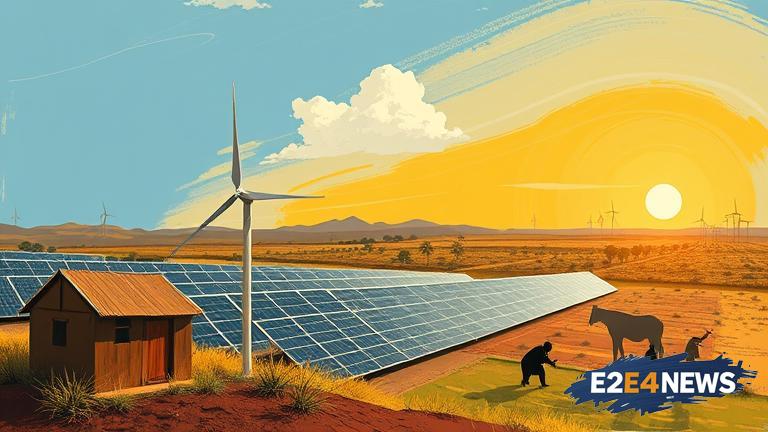The African continent is witnessing a significant shift towards renewable energy, driven by the need to address the pressing issues of energy access, energy security, and climate change. With many countries still struggling to provide reliable and affordable electricity to their citizens, renewable energy has emerged as a viable solution. Solar and wind power are leading the charge, with countries like South Africa, Egypt, and Morocco investing heavily in these sectors. The cost of renewable energy technologies has decreased dramatically over the years, making them more competitive with fossil fuels. This has led to a surge in investment, with many international companies and organizations committing to support Africa’s renewable energy ambitions. The African Union’s Agenda 2063 has set a target of ensuring access to clean and affordable energy for all Africans by 2030. To achieve this, the continent will need to increase its renewable energy capacity significantly. Several countries have already made notable progress, with Kenya, for example, generating over 70% of its electricity from renewable sources. Rwanda has also set an ambitious target of becoming a carbon-neutral economy by 2050. The benefits of renewable energy are numerous, including reduced greenhouse gas emissions, improved air quality, and enhanced energy security. Moreover, renewable energy can create jobs and stimulate local economies, contributing to sustainable development. However, there are still significant challenges to overcome, including the lack of infrastructure, limited access to financing, and policy and regulatory frameworks that often favor fossil fuels. To address these challenges, governments, international organizations, and the private sector must work together to create an enabling environment for renewable energy development. This includes investing in grid infrastructure, providing training and capacity-building programs, and implementing policies that support the growth of the renewable energy sector. The African Development Bank has launched several initiatives to support the development of renewable energy in Africa, including the New Deal on Energy for Africa. The program aims to achieve universal access to energy by 2025, with a focus on renewable energy and energy efficiency. The International Renewable Energy Agency (IRENA) has also launched a number of initiatives to support the development of renewable energy in Africa, including the Africa Renewable Energy Initiative. The initiative aims to double Africa’s renewable energy capacity by 2025 and achieve at least 300 GW of renewable energy capacity by 2030. As the demand for energy continues to grow, it is essential that African countries prioritize renewable energy development to ensure a sustainable and prosperous future. The use of renewable energy can also help to reduce the continent’s reliance on imported fossil fuels, improving energy security and reducing the impact of price volatility. Furthermore, renewable energy can help to promote economic development, improve healthcare, and enhance food security. In addition, the development of renewable energy can help to create new opportunities for entrepreneurship, innovation, and job creation. The growth of the renewable energy sector can also help to stimulate local economies, contributing to poverty reduction and improved living standards. Overall, the future of renewable energy in Africa looks promising, with many countries committed to transitioning to a low-carbon economy. As the continent continues to grow and develop, it is essential that renewable energy remains a priority, driving sustainable development and improving the lives of millions of Africans.
